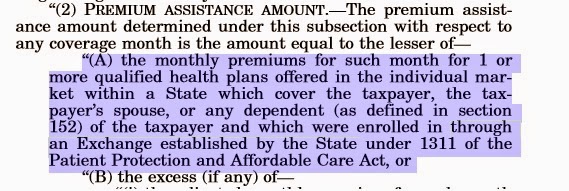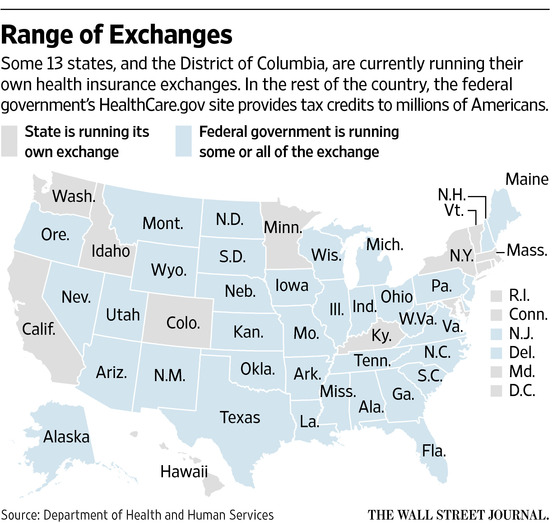Oral Arguments for King V. Burwell








On March 4th, the Supreme Court began hearing oral arguments for King V. Burwell (the ObamaCare subsidy lawsuit about an exchange established by the state).
Get a transcript of the oral arguments here.
Below is what we know about King V. Burwell based on the Supreme Court Judge’s past positions on things and live blogging of the hearings. (The Supreme Court has never allowed cameras in its courtroom, but it does make audiotapes of oral arguments and opinions available to the public. We don’t have a tape of the arguments yet, but are following other bloggers who are actually live blogging from the Supreme Court):
- If the Court sides with the plaintiffs (King) instead of Burwell (the HHS secretary), millions of people will lose their health insurance.
- Breyer, Ginsburg, Sotomayor, and Kagan are expected to rule in favor.
- Justices Scalia, Thomas, and Alito are expected to rule in favor of Anything-But-Obamacare, that leaves Chief Justice Roberts and Justice Kennedy.
- Justice Kennedy says he sees “a serious constitutional problem” in the idea Congress would force states to set up exchanges or risk their residents losing tax credits. The suggestion could spell trouble for the challengers.
- Get a breakdown on how Justice Kennedy and Chief Justice Roberts might rule.
Highlights of March 4th Oral Arguments
Here are the highlights from the oral hearings all quoted from WSJ.com from . Get the whole live blogging experince from the Wall Street Journal.
- Spotted Inside: Michael Cannon, one of the architects of the suit, along with a colleague from the Cato Institute libertarian think-tank, and spokeswomen for the Competitive Enterprise Institute, the libertarian group that has bankrolled the Virginia suit and others.
- Only 13 states are currently running their own health exchanges, which means tax credits awarded to people in those 13 states aren’t being challenged today.
- First up was Michael Carvin of law firm Jones Day, representing the challengers. He also argued part of the Supreme Court health care case in 2012. Mr. Carvin told my colleague Jess Bravin that his clients aren’t always the most popular, but they “need a neutral day in court.”
- Representing the government was Solicitor General Donald Verrilli, whose last health-care argument got off to an inauspicious start when he coughed and stammered as he began his presentation three years ago. Mr. Verrilli faced criticism for his argument performance, but he had the last laugh when the court’s ruling largely went in favor of the government.
- Justice Ginsburg asked Mr. Carvin detailed questions about the four individuals who have brought the case, and their ability to show they had been harmed by the law’s tax credits. She asked about the veteran status of Mr. Hurst, in particular, and was told by Mr. Carvin that Mr. Hurst had served ten months on active duty in 1970 and that this alone was insufficient to qualify him for Veterans Affairs care.
- Most observers expect today’s arguments to reflect an ideological divide among the justices. They split in the last health care case, with Chief Justice John Roberts providing the crucial vote to uphold the Affordable Care Act’s mandate that individuals carry insurance or pay a penalty. Here’s the earlier ruling.
- The government has questioned the standing already of two plaintiffs, David King and Rose Luck, based on calculations of their income, and the Journal has reported that additional questions also surround the attestations they made to the court. Justice Ginsburg turned her attention to Brenda Levy, the fourth plaintiff, a 64-year-old substitute teacher from Richmond who will turn 65 in June, when the case is decided, and become eligible for Medicare. Some legal experts have questioned if this could render the case moot. Mr. Carvin said her standing remained intact because she is still subject to the requirement to buy coverage in the first few months of the year, and her taxes at the end of the year will be affected. Justice Ginsburg wrapped up her questions after about four minutes, telling Mr. Carvin she did not want to detain him further.
- The discussion then turned to the merits of the government’s case. Mr. Verrilli said the Obama administration’s reading of the law was really the only one that made sense. Allowing subsidies nationwide is compelled by the structure and design of the Affordable Care Act, he said. Mr. Carvin’s interpretation can’t be what Congress intended, he said. Justice Antonin Scalia jumped in and said, “Of course it could be.” What mattered, Justice Scalia said, is how Congress actually wrote the law.
- Justice Alito challenged the prophecies of doom the government and its allies have made should the plaintiffs win. Justice Alito said the court could mitigate that problem by delaying implementation of such a ruling so that states could get their exchanges up.
- Mr. Carvin first addressed his clients’ standing. He was sure that at least one of them, Mr. Hurst, made enough money in 2014 to trigger the individual mandate to buy insurance or pay a penalty, but would have qualified for a hardship exemption had the subsidy not lowered his coverage costs so dramatically. The lawsuit survives even if only one of the four plaintiffs turns out to have legal standing.
- Justice Kennedy said that if the language was ambiguous, then it could raise what the court calls “Chevron” deference, after a 1984 case involving the oil company. The court held then that when a statute is open to varied readings, judges should defer to the interpretation used by the expert agency that administers the law. In this instance, it would be the IRS which administers the tax credits.
- Justice Roberts said, “If you’re right about Chevron, that would indicate a subsequent administration could change that interpretation?”
- BOTTOM LINE: It likely will be a close one. Chief Justice John Roberts — who wrote for the majority preserving the Obama health law in 2012 — didn’t say all that much, so hard to know his thinking. Justice Anthony Kennedy — who sided with the opponents in that challenge — appears more in play than last time.
ObamaCareFacts.com Opinion: The Court sides with the ACA. We don’t see another repeal subsidies case while President Obama is in office, however the ruling leaves the door open for repeal if we get a Republican President in 2016.
Read the transcript of the oral arguments and let us know what you think by commenting below.

Learn More About King V. Burwell and the Uninsured
- You can get up-to-date information on the King V. Burwell case on the SCOTUS blog.
- You can get up-to-date information from the Wall Street Journal.
- You can get the breakdown of King V. Burwell here.
- You can get an explanation of “an exchange established by the state” here.
- Learn more about other ObamaCare lawsuits here.
- The uninsured are 25% more likely to die than the insured. About 8.2 million Americans could be uninsured if the courts side with the Plaintiffs. Learn more about the uninsured and the mortality rate.
Twiz
With Scalia out I doubt we will see any movement on this issue…but what a disaster of a program. The two largest insurers in the U.S have now decided they would prefer to walk away than take government subsidies as they are losing money hand over fist. They should have treated healthcare like welfare and stay out of the private market. Either that or implement truly nationalized healthcare (which I am against) but going half way is just a typical waste of tax payer money. It gets democrats votes and gives republicans something to complain about while we all continue to pay for things we don’t get…just like public education at the local level of most major cities.
Ed
Sure, this individual liberty consumed by a power hungery left wing today. What individual rights disappear tomorrow? We’re getting a real life lesson in understanding the concerns that drove the Bill of Rights.
ObamaCareFacts.comThe Author
Some would argue that individual liberty is dependent upon having access to basics like food, shelter, and healthcare. It’s not the everyone gets a designer handbag law, ObamaCare’s Marketplace subsidies are tax credits that are offered to working Americans claiming over 100% of the Federal Poverty Line.
SATworks
Unfortunately, those making 99% or less of the Federal Poverty Line get ZERO assistance. They must pay the full rate for PPACA dictated insurance. That is neither “Patient Protection”, nor “Affordable Care”.
It is a shame that so few Americans are aware of this little known inconvenient truth.
ObamaCareFacts.comThe Author
Those making under 100% of the Federal Poverty Level (99% or less) were supposed to have access to Medicaid under Medicaid expansion, but many states decided not to expand Medicaid after the supreme court ruled that states could opt out during NFIB v Sebelius in 2012. You can read more about Medicaid expansion, what states expanded as of 2015, and learn about the SCOTUS ruling on Medicaid here: https://obamacarefacts.com/obamacares-medicaid-expansion/
Tom Graham
The proper role of government is to ensure the blessings of liberty, provide for the common defense, and PROMOTE the general welfare.
Promote is a very different word than provide or ensure.
Tony
Obamacare does not “provide” insurance. It allows individuals to obtain insurance who would otherwise be unable due to preexisting conditions, or high cost relative to a person’s wage.
Dyrren Barber
I truly thank you for citing the Preamble of the Constitution. All to often I believe people do not weight it into their political thinking. Promote the general welfare and secure the blessings of liberty for ourselves and our prosperity are FUNDAMENTAL duties of our Republic. . .
Wbmq
Promoting is an umbrella term that could include both providing and insuring.
Woody
There is no such thing as a Federal Insurance Exchange! By law, Congress endorsed state oversight of insurance in 1945 with the McCarran-Ferguson Act. The only things the feds runs is a web site. That is hardly an Exchange. All states regulate insurance companies doing business in their own states.
I bought healthcare coverage from the federal web site but all I was offered was a list of companies operating in my state. In other words, in my states exchange.
Why has this point never bee raised?
The whole premise of this lawsuit is MOOT!
ObamaCareFacts.comThe Author
That is smart, thanks for the contribution.
Mike Skiba
Good point.
Mike Skiba
I still think that they should have read it before voting on it.
danl
Let the law stand. Demand exchanges for all states.